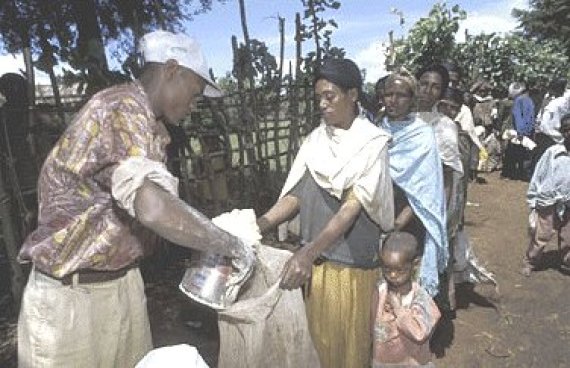Every few years the north of Ethiopia is plagued by drought, food shortages and famine. But even in the wetter years, farmers – who make up 80 percent of the population – have great difficulty making a subsistence living from their land. This prompted the Ethiopian government to launch the Production Safety Net Programme (PSNP), which aims to relieve food shortages at household level. Since 2009, eight million Ethiopians have received food through this programme. Siyoum researched the ‘food for work’ projects in particular. In these projects, farmers provide labour in exchange for food. He interviewed farmers in one of the northern provinces over a period of six months. The food aid is certainly useful but it does little or nothing to solve the farmers’ real problem: food insecurity. This is reflected in government figures. Since 1974, the Ethiopian government has developed all kinds of programmes aiming to improve food security but only 5 to 10 percent of the recipients are now ‘food secure’. This is because the programmes do not tackle the systemic causes of low agricultural productivity. These are environmental degradation, low soil fertility, plant diseases and a lack of technology and credit for farmers. As a result of these factors, production has dropped in most places, while the population has grown. Have the farmers grown so addicted to food aid that they no longer invest in agriculture? No, says Siyoum: that is not the case because the food aid only constitutes 10 percent of the farmers’ total food supply. Nevertheless, addiction to aid is used by western donors and the Ethiopian government as an argument for winding down the food aid. So the Ethiopian government is taking more notice of the donors than of its own people, Siyoum argues. A key bottleneck for the aid programme is that the farmers have to work for the government in order to qualify for food. This means that in farming families with little labour available, the ‘food for work’ programme is carried out at the expense of agricultural production, Siyoum discovered. However, scrapping the food aid programme would not lead immediately to higher production. Something else that is lacking is an agricultural extension service that offers farmers systematic help to raise their productivity. Ethiopia’s food policy should also become less top-down and more sensitive to the requirements and wishes of farmers, says Siyoum. Achale Dagnachew Siyoum received his PhD on 17 September from Thea Hilhorst, professor of Disaster Studies and Reconstruction.
Food Aid does not create food security
For years, the Ethiopian government has been giving food aid to farmers in the dry northern part of the country to stave off hunger. But this has not helped to increase food security among the rural population, reveals a study by Aschale Siyoum.

